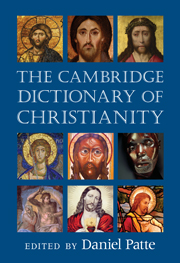36 results
B
-
- Book:
- The Cambridge Dictionary of Christianity
- Published online:
- 05 August 2012
- Print publication:
- 20 September 2010, pp 91-161
-
- Chapter
- Export citation
J
-
- Book:
- The Cambridge Dictionary of Christianity
- Published online:
- 05 August 2012
- Print publication:
- 20 September 2010, pp 632-680
-
- Chapter
- Export citation
X
-
- Book:
- The Cambridge Dictionary of Christianity
- Published online:
- 05 August 2012
- Print publication:
- 20 September 2010, pp 1337-1337
-
- Chapter
- Export citation
The Cambridge Dictionary of Christianity - Half title page
-
- Book:
- The Cambridge Dictionary of Christianity
- Published online:
- 05 August 2012
- Print publication:
- 20 September 2010, pp i-ii
-
- Chapter
- Export citation
Q
-
- Book:
- The Cambridge Dictionary of Christianity
- Published online:
- 05 August 2012
- Print publication:
- 20 September 2010, pp 1037-1040
-
- Chapter
- Export citation
E
-
- Book:
- The Cambridge Dictionary of Christianity
- Published online:
- 05 August 2012
- Print publication:
- 20 September 2010, pp 340-405
-
- Chapter
- Export citation
C
-
- Book:
- The Cambridge Dictionary of Christianity
- Published online:
- 05 August 2012
- Print publication:
- 20 September 2010, pp 162-298
-
- Chapter
- Export citation
L
-
- Book:
- The Cambridge Dictionary of Christianity
- Published online:
- 05 August 2012
- Print publication:
- 20 September 2010, pp 700-750
-
- Chapter
- Export citation
N
-
- Book:
- The Cambridge Dictionary of Christianity
- Published online:
- 05 August 2012
- Print publication:
- 20 September 2010, pp 853-881
-
- Chapter
- Export citation
D
-
- Book:
- The Cambridge Dictionary of Christianity
- Published online:
- 05 August 2012
- Print publication:
- 20 September 2010, pp 299-339
-
- Chapter
- Export citation
Contents
-
- Book:
- The Cambridge Dictionary of Christianity
- Published online:
- 05 August 2012
- Print publication:
- 20 September 2010, pp v-vi
-
- Chapter
- Export citation
P
-
- Book:
- The Cambridge Dictionary of Christianity
- Published online:
- 05 August 2012
- Print publication:
- 20 September 2010, pp 917-1036
-
- Chapter
- Export citation

The Cambridge Dictionary of Christianity
-
- Published online:
- 05 August 2012
- Print publication:
- 20 September 2010
H
-
- Book:
- The Cambridge Dictionary of Christianity
- Published online:
- 05 August 2012
- Print publication:
- 20 September 2010, pp 490-579
-
- Chapter
- Export citation
Preface
-
-
- Book:
- The Cambridge Dictionary of Christianity
- Published online:
- 05 August 2012
- Print publication:
- 20 September 2010, pp xlv-lx
-
- Chapter
- Export citation
Abbreviations
-
- Book:
- The Cambridge Dictionary of Christianity
- Published online:
- 05 August 2012
- Print publication:
- 20 September 2010, pp lxv-lxviii
-
- Chapter
- Export citation
O
-
- Book:
- The Cambridge Dictionary of Christianity
- Published online:
- 05 August 2012
- Print publication:
- 20 September 2010, pp 882-916
-
- Chapter
- Export citation
Z
-
- Book:
- The Cambridge Dictionary of Christianity
- Published online:
- 05 August 2012
- Print publication:
- 20 September 2010, pp 1340-1343
-
- Chapter
- Export citation
T
-
- Book:
- The Cambridge Dictionary of Christianity
- Published online:
- 05 August 2012
- Print publication:
- 20 September 2010, pp 1205-1255
-
- Chapter
- Export citation
The Cambridge Dictionary of Christianity - Half title page
-
- Book:
- The Cambridge Dictionary of Christianity
- Published online:
- 05 August 2012
- Print publication:
- 20 September 2010, pp lxix-lxx
-
- Chapter
- Export citation

